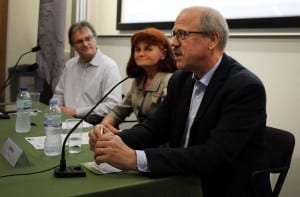Arctic risks and rewards
By ucyow3c, on 25 June 2016

The panel at ‘Development in the Arctic: Risks and Rewards’
![]() Written by Dr Ilan Kelman, Reader for Risk, Resilience and Global Health (UCL Institute for Risk & Disaster Reduction)
Written by Dr Ilan Kelman, Reader for Risk, Resilience and Global Health (UCL Institute for Risk & Disaster Reduction)
The Arctic: The last earthly frontier of adventure, excitement, remoteness, and resources! Or is it? Given that people have lived in the high latitudes for millennia, how remote, isolated, and open-for-business-for-southerners is the Arctic?
The UCL Institute for Risk & Disaster Reduction’s Arctic Research programme convened a panel ‘Development in the Arctic: Risks and Rewards’ at UCL on 8 June to discuss these questions.
To an engaged audience of about sixty, three distinguished panellists explored how climate change and technological advances might or might not be opening up the Arctic for exploitation by the world. They examined what we know and do not know about development risks and rewards in the far north.
What realities of Arctic environmental conditions are rarely described? What Arctic social and political circumstances are frequently circumvented? What about the people who live in the region who have rights and interests? The risks and rewards regarding the so-called ‘Arctic Gold Rush’ for resources and development was examined and critiqued.
Guy Yeomans from Arctic Futures opened by explaining strategic foresight for understanding Arctic possibilities–but always in connection with the people who live there, to listen to and understand their views. Nina Poussenkova from Sampo in Moscow provided a Russian perspective, especially focused on corporate social responsibility for Arctic petroleum exploration and exploitation in Russia. Kaj Riska from TOTAL E&P, closed by highlighting the technological constraints and opportunities of Arctic operations.
A lively question-and-answer session followed. Topics included data availability and reliability, community perceptions and attitudes, and possible challenges to Arctic operations from space weather. The discussions continued into the reception afterwards, with business and NGO representatives mingling with academics to exchange ideas.
With so many social and environmental uncertainties, with so many Arctics, and with so many trying to grab a stake in possible rewards, managing the risks might not be fully acknowledged. The future holds many challenges and opportunities, especially for Arctic peoples who deserve much more than decisions being made about them.
 Close
Close

